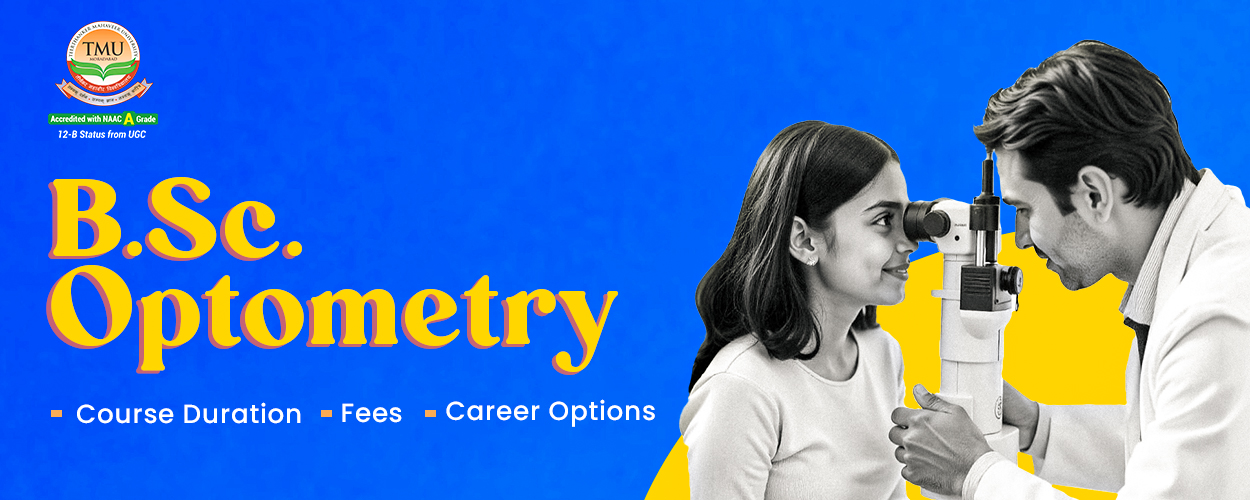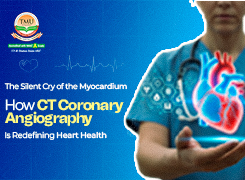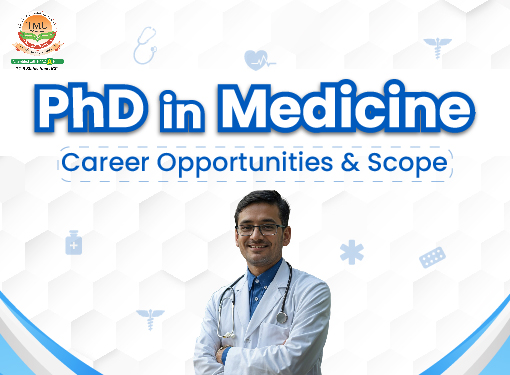Bachelor of Science (B.Sc.) in Optometry: Course Details, Fees, Career Options & Benefits
Table of Contents
Eye care is one of the fastest-growing areas within the healthcare sector, driven by increasing screen usage, lifestyle changes, and an ageing population. Among the many allied health science programs available today, B.Sc. Optometry stands out as a specialised undergraduate course that combines medical knowledge, clinical skills, and patient care. This programme prepares students to diagnose, manage, and treat various visual and eye-related conditions while working closely with ophthalmologists and healthcare professionals.
A B.Sc. Optometry degree offers a strong balance between theory and hands-on clinical training, making graduates job-ready for hospitals, eye clinics, optical chains, and research institutions.
B.Sc. Optometry Key Highlights
| Particulars | Details |
| Course Name | Bachelor of Science in Optometry |
| Course Level | Undergraduate |
| Duration | 4 years (including internship) |
| Eligibility | 10+2 (Science stream – PCB/PCM) with minimum 50% marks |
| Admission Process | Merit-based / Entrance exam (varies by university) |
| Average Course Fee | ₹1.5 – ₹4 lakh (for the complete program) |
| Average Salary | ₹3 – ₹6 LPA for freshers |
| Top Recruiters | Eye Hospitals, Vision Clinics, Optical Chains, NGOs, Research Centres |
Teerthanker Mahaveer University
Apply for Admission
Click Here To Apply for Admission
Why Pursue B.Sc. Optometry?
Choosing a B.Sc. Optometry will provide you with a stable and respected career in the future. As demand for skilled eye care specialists increases, the field offers a wide range of opportunities and career growth. B.Sc. Optometry graduates can work in various organisations such as an eye care clinic, optical shop, optical manufacturing companies and many more.
As the skills of the qualified professionals in the eye care industry are in high demand, the graduates may consider having a successful career in the healthcare industry. B.Sc. Optometry offers a high earning potential. In India, you can earn an average salary between ₹5 to ₹6 lakhs annually as a fresher. With years of experience in the field of optometry and specialisation in ocular disease, the annual income of an experienced ophthalmologist may reach 10-12 lakhs.
The Bachelor of Optometry programme enables graduates to become skilled optometrists who can examine and treat a broad spectrum of vision disorders, give prescriptions of corrective glasses, and identify eye diseases. B.Sc. Optometry graduates can either start working or decide to study further in the field of optometry and vision sciences.
Eligibility Criteria
If you are dreaming of studying the B.Sc. Optometry programme, you are required to meet the following eligibility criteria:
- To join the B.Sc. Optometry programme, you need to complete your senior secondary education with at least a minimum of 50% marks.
- Only students from the science stream are eligible to apply for the B.Sc. Optometry course.
- The core subjects should be Physics, Chemistry and Biology/Mathematics.
- The minimum age should be 17 years at the time of engineering.
Subject Covered in B.Sc. Optometry
| Year | Subjects Covered |
| 1st Year | Human Anatomy & Physiology, Ocular Anatomy, Biochemistry, Physics of Light, Geometrical Optics, English and Communication Skills |
| 2nd Year | Visual Optics, Ocular Diseases, Microbiology, Pharmacology, Optometric Instruments |
| 3rd Year | Contact Lens Studies, Low Vision Aids, Binocular Vision, Pediatric Optometry, Clinical Optometry |
| 4th Year | Clinical Internship, Vision Therapy, Community Optometry, Hospital Practice, Project Work |
Admission Process for B.Sc. Optometry
- Apply Online: Fill out the online application form at the original site of the college.
- Documentation: Provide all the required documents.
- Entrance Exam: Pass the entrance exam, e.g., NEET or CUET.
- Merit-Based: Some colleges will choose you based on your merit in Class 12.
- Counselling: The short-listed candidates will be invited to counselling.
- Final Admission: Once a successful counselling session is done, you will be expected to produce original documents, which will be checked and pay the admission fee.
Entrance Exam for B.Sc. Optometry
- AIIMS Entrance Exam
- NEET-UG (in some universities)
- CUET (Central Universities Entrance Test)
- College-level entrance tests
Fee Structure for B.Sc. Optometry
| Type of Institute | Average Annual Fee |
| Government Colleges | ₹25,000 – ₹70,000 |
| Private Colleges | ₹50,000 – ₹1.2 lakh |
| Deemed Universities | ₹1.5 – ₹2 lakh |
Why Pursue Optometry at TMU?
Experience Advanced Eye-Care Education with TMU’s B.Optom Programme!
Teerthankar Mahaveer University provides a comprehensive Bachelor of Optometry (B.Optom) program-an advanced, industry-aligned course that prepares you to become skilled optometrists. The Optometry programme at TMU has been designed to impart knowledge in the form of courses, seminars, projects and internships. The university motivates students to interact within and across the subject areas.
- Real Clinical Exposure: TMU provides real clinical exposure to students. The university provides both theoretical and practical learning so that students can gain real-life experience. By working directly with patients, candidates learn how to perform eye examinations and visual tests accurately.
- Modern Laboratories: Teerthankar Mahaveer University has modern and well-equipped laboratories with good facilities to be undertaken practicals. Here, students get hands-on training for the healthcare field.
- Updated Curriculum: The Bachelor of Optometry programme at TMU is a clinically focused course designed to prepare students for professional practice. The curriculum includes subjects like Ocular Anatomy, Physiology, Optics, and Clinical Optometry.
- Experienced Faculty: The faculty of B.Optometry at TMU holds advanced degrees and has research and industry experience. They encourage students to participate in competitions and internships. Beyond academics, the faculty members of TMU provide an opportunity to get real-world experience. The faculty provides practical advice and mentorship to the students.
TMU’s Optometry Programme Highlights
| Particulars | Details |
| Course Name | Bachelor of Optometry (B.Optom) |
| Duration | 4 Years (including internship) |
| Eligibility | 10+2 (Science – PCB/PCM) with minimum 50% marks |
| Affiliated Hospital | TMU Medical College & Research Centre |
| Higher Study Option | M.Sc. in Optometry offered by TMU |
Admission Process for B.Optometry at TMU
Meet Eligibility Criteria
- To get admission in the B.Optometry programme at TMU, you are required to pass 10+2 in the science stream.
- You must achieve a minimum of 50% marks.
Admission Process
- You can apply online for the Optometry programme through the official admission page of TMU.
- Finish the application form and fill out the information.
- Upload required documents
- After successfully applying, the TMU Admission Cell will coordinate with you for the further process.
- Pay the admission fee and confirm your seat
Career Opportunities After B.Optom
| Job Role | Primary Responsibilities | Typical Salary Range |
| Optometrist / Clinical Optometrist | Conduct eye exams, refraction, prescribe glasses/contact lenses, detect eye disorders; work in hospitals, clinics, and optical stores. | Fresh: ₹ 2.5 lakh – ₹ 4 lakh With experience: ₹ 4 lakh – ₹ 8 lakh In some cases/specialist: ₹ 8 lakh – ₹ 12+ lakh /td> |
| Contact Lens Specialist | Focus on fitting contact lenses, advanced lens types, and managing contact-lens-related complications. | ₹ 4.5 lakh – ₹ 9 lakh or more with specialisation. |
| Low Vision / Rehabilitation Specialist | Work with patients having low vision (partial sight), teach the use of low‐vision aids, rehabilitation. | ~ ₹ 4 lakh – ₹ 8.5 lakh+ depending on specialization and practice. |
| Optical Retail / Dispensing Optometrist / Store Manager | In optical store chains, managing lens dispensing, customer consultations, store operations, and sometimes the store manager role. | ~ ₹ 3 lakh – ₹ 5 lakh for entry/mid roles. With management: ₹ 5 lakh+ or more. |
| Researcher / Teaching / Academia in Optometry | Teaching in optometry colleges, conducting research in vision science or eye-care technologies. | Mid/senior: ~ ₹ 5 lakh – ₹ 10 lakh+ (varies widely) |
| Entrepreneur / Private Practice Owner | Setting up one’s own eye-care clinic or optical store, building a client base, and managing business. | Potentially higher income, but wide variation: could start lower until practice grows; ₹ 10 lakh+ with established practice. |
Work Areas Include:
- Eye hospitals and clinics
- Private practice
- Optical retail stores (like Titan Eye Plus, Lenskart, Lawrence & Mayo)
- NGOs working for eye health
- Corporate health departments
- Research and academic institutions
The work environment is usually clean, comfortable, and professional. Optometrists can also set up their own independent eye care clinics, giving them the freedom to practice privately and earn well.
Higher Studies Option after B.Optometry
| Course / Program | Career Opportunities |
| Master of Optometry (M.Optom) | Senior Optometrist, Clinical Specialist, Lecturer |
| M.Sc. in Optometry | Research Associate, Academic Faculty, Vision Scientist |
| MBA in Healthcare / Hospital Administration | Hospital Administrator, Healthcare Manager, Consultant |
| PhD in Optometry / Vision Science | Research Scientist, Professor, Vision Science Expert |
| Fellowship Programs | Specialist Optometrist, Eye-Care Consultant |
| Short-Term Certification Courses | Optical Technician, Clinical Assistant, Specialist in Niche Fields |
| Study Abroad (Postgraduate & Doctoral) | Global Optometrist, Researcher, International Practitioner |
Summary
Optometry provides the graduates with a lot of career opportunities. You may work in hospitals, clinics, or retail, like the vision centre or optical store. It is an ideal field for those who want to contribute to the healthcare industry. The importance of eye health ensures that there is a constant demand for optometric treatments. Moreover, optometrists are able to choose among different types of eye care specialities such as poor vision restoration, glasses and contact lenses fitting, children's optics, and geriatric optometry.
FAQ
Q1. Is B Optom a doctor?
Ans. No. Optometrists are not medical doctors (MDs). They hold a Doctor of Optometry (OD) degree focused on vision care.
Q2. What is the meaning of B Optom?
Ans. The meaning of B Optom is Bachelor of Optometry. The programme enables graduates to become skilled optometrists who can examine and treat a broad spectrum of vision disorders
Q3. What is the optometry course salary?
Ans. Average Annual Salaries per Position (Estimate): Optometrist (General): 3.5 lakh -6 lakh. Clinical Optometrist: 4 lakh -8 Lakh. Contact Lens Specialist: 450000 to 900000. Pediatric Optometrist: 3.5 lakh 7 lakh.
Q4. Does B Optometry require NEET?
Ans. No, NEET is not mandatory in Optometry classes in India. Programs in optometry, usually Bachelor of Optometry (B. Optom) courses, are admission-dependent in each particular university.
This content gives an overview of the programme and is for educational purposes only. For updated admission guidelines and counselling support, please connect with our Counsellor Team.














